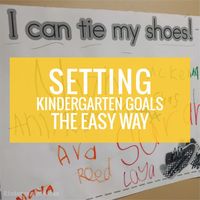Kindergarten is a crucial phase in a child's educational journey, setting the foundation for their future academic and social success. This guide aims to provide a thorough understanding of the key goals that kindergarteners should focus on during the year. Whether you are a kindergarten teacher, parent, or simply interested in child development, this article will offer valuable insights and resources to support your child's journey.
What Makes for a Good Kindergarten Experience?
A good kindergarten experience is one that supports the social, emotional, problem-solving, and study skills that children will need throughout their schooling. Kindergarten should be a nurturing environment that fosters independence, self-esteem, and a love of learning.
Why Kindergarten?
Kindergarten provides children with opportunities to learn and practice essential skills such as sharing, listening, and taking turns. It also helps develop their self-esteem and encourages cooperation with their peers. Additionally, kindergarteners are naturally curious; it is important to foster this curiosity and direct it towards engaging in meaningful learning experiences.
What Does an Ideal Kindergarten Look Like?
An ideal kindergarten program should:
- Expand your child's ability to learn about and from the world
- Organize information and solve problems
- Provide a combination of formal and informal activities
- Minimize use of large group activities
- Foster a love of books, reading, and writing
When looking at programs, consider the specific needs of your child and family. Every child is unique, and not every program is perfect for every child. It's important to talk to your child's preschool teacher, visit a few schools, and talk to the principal or a kindergarten teacher before deciding on a program.
What If the Program Is Less Than Ideal?
If your concern about the quality of the program is ongoing, it is important to give the program and teacher some time to get off to a strong start. If you observe a noticeable difference in your child's class when they start in the fall, there may be a good reason for this. Many programs start slowly, taking time to help children separate from their families and feel confident in school before adding learning demands.
If after a few weeks you still have concerns, talk to the teacher. Ask her about her goals and share your expectations. Sometimes an apparent mismatch can be just a difference in approach. Keep the dialogue going. Ask for information, but also be willing to hear the "whys" of the teacher's philosophy.
In some cases, it may be necessary to switch to a different teacher or school. This can be the result of many classroom observations of your child by the teacher, principal, and/or another professional. It is important to have group consensus on this decision.
Help Prepare Your Child for a Successful School Year with the Best Kindergarten Books at The Scholastic Store. Plus, explore more expert-approved kindergarten books, tips, and resources at our guide to getting ready for kindergarten, including recommended kindergarten readers.
Academic & Social Goals for Kindergarten Students
Kindergarten students should focus on:
Reading
- Hold a book the right way up
- Read from left to right
- Use fingers to track underneath each word as they read
- Retell a story from start to finish
- Read for longer periods of time without getting tired
- Read to self for 5 minutes
Writing
- Write all the sounds that they hear when they sound out a word
- Stretch out the sounds in words
- Spell CVC words
- End sentences with a full stop
- Write a complete sentence
- Form lowercase letters correctly
- Use handwriting lines correctly
Math
- Name numbers up to 10
- Name decade numbers
- Count to 20
- Use objects and fingers to add
- Use doubles facts to add and subtract
Personal Learning Goals
- Work safely with others
- Tuck chair in
- Walk safely in lines
- Think before speaking
- Try their best
- Share and take turns
8 SMART Goals Examples for Kindergarten Teachers – Develop Good Habits
Kindergarten teachers can use SMART goals to improve their teaching practices and support their students' social and emotional development. Here are several examples of SMART goals for kindergarten teachers:
-
Organize Crafting Sessions: The teacher will plan and implement once-weekly crafting sessions to help students prepare for school.
-
Assess Writing Skills: The teacher will spend 15 minutes each day to teach students how to write their names and identify skill differences among them.
-
Read Books on Child Development: The teacher will read books about child development to improve their knowledge and come up with better activities and lesson plans.
-
Encourage Love of Reading: The teacher will incorporate daily reading time to develop students' language skills and prepare them for school.
-
Meet with Parents: The teacher will have monthly meetings with parents to discuss their child's interests and skills and create appropriate lesson plans.
-
Play Upbeat Songs: The teacher will play upbeat songs during the classroom to help students feel more relaxed and comfortable.
-
Speak with Children: The teacher will spend half an hour daily to converse with students about their interests and needs to improve their relationships with them.
-
Incorporate Group Work: The teacher will plan activities that require teamwork and improve relationships among students.
By focusing on SMART goals, kindergartene teachers can create a supportive and enriching learning environment that encourages independence, self-esteem, and a love of learning.







